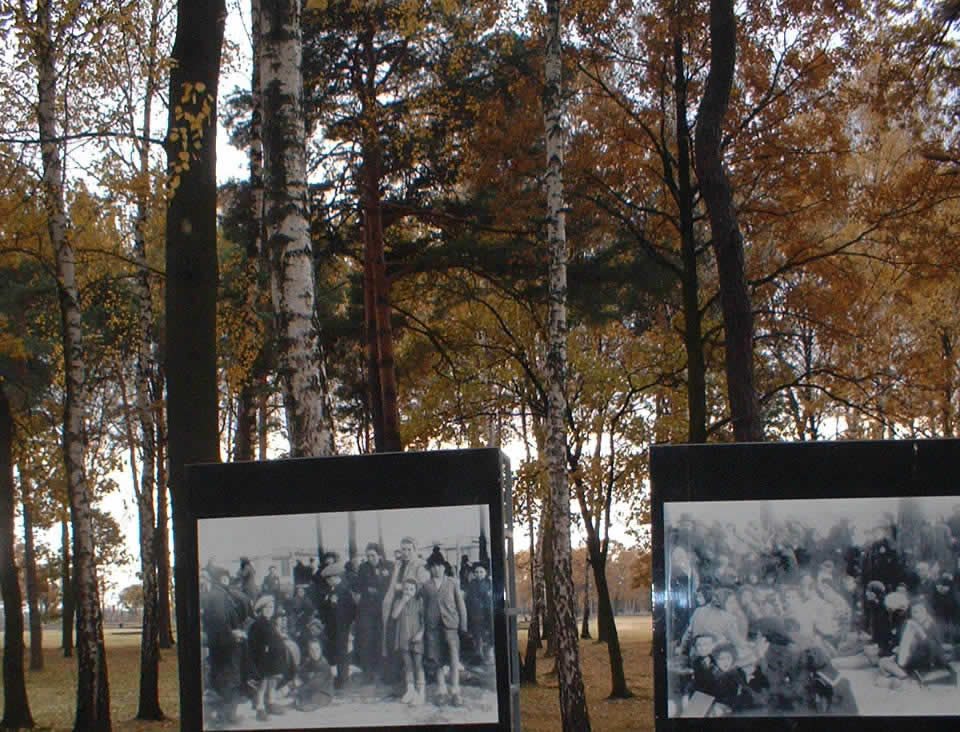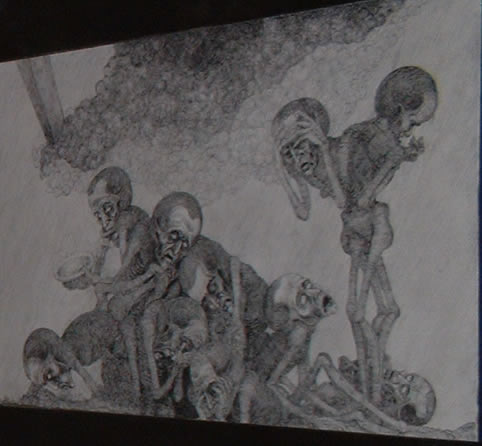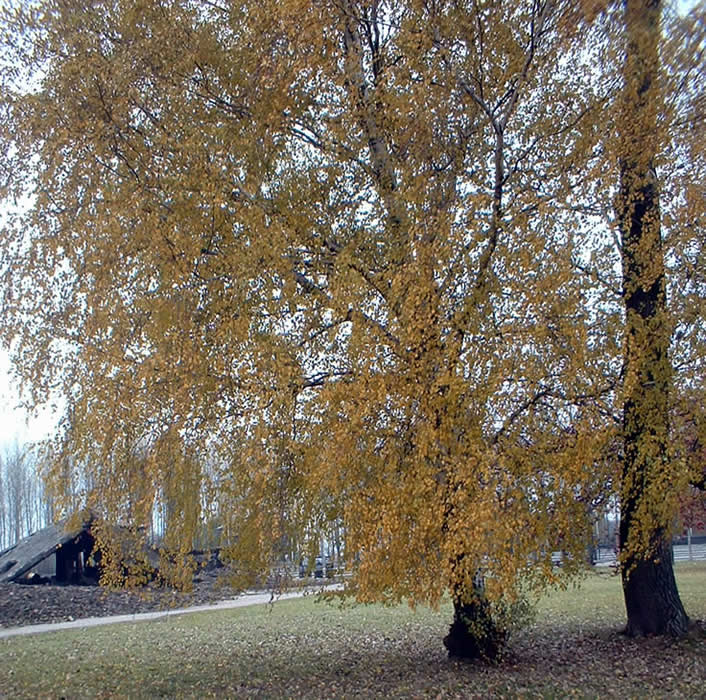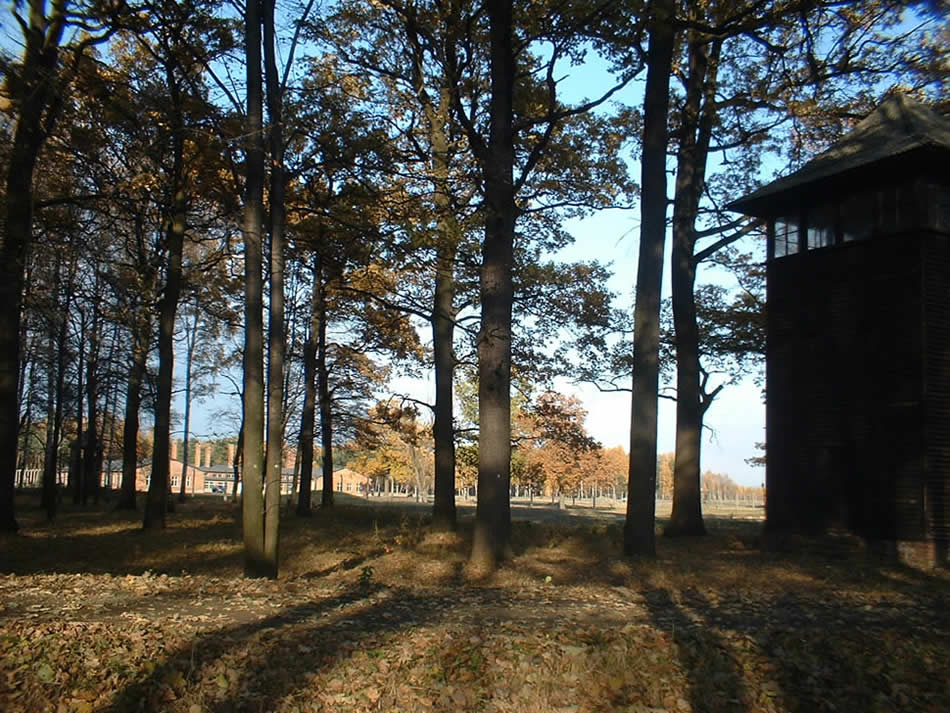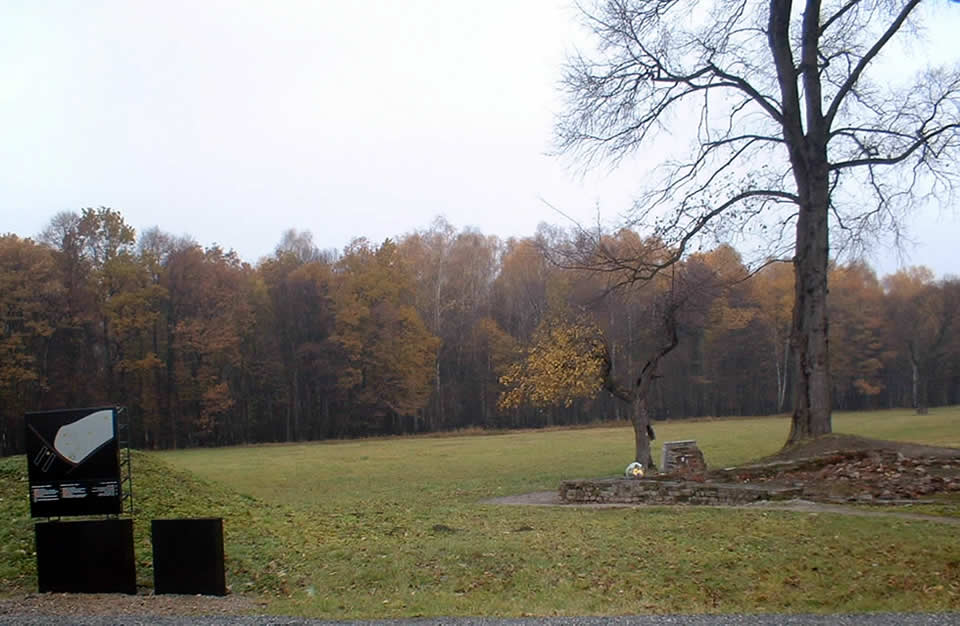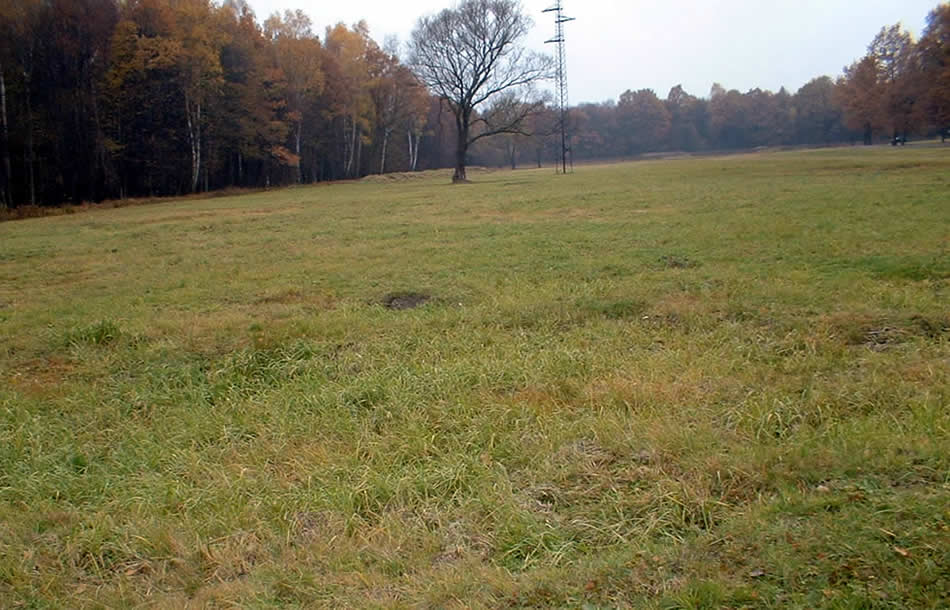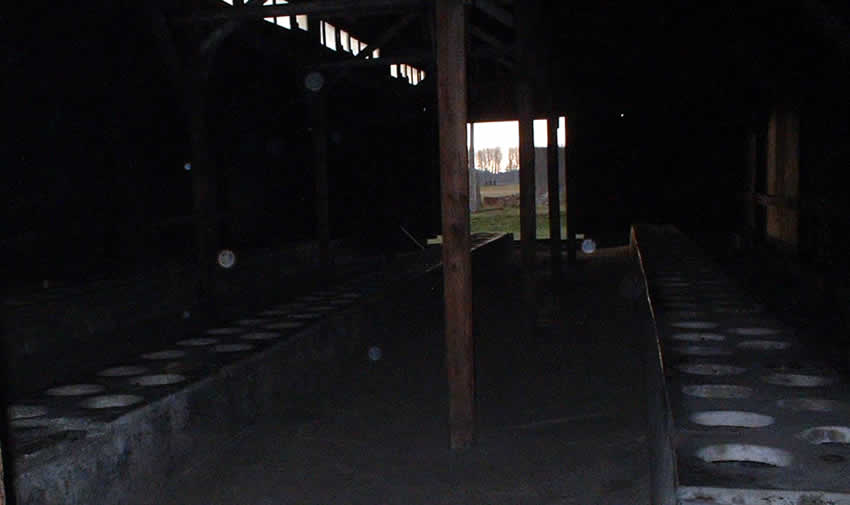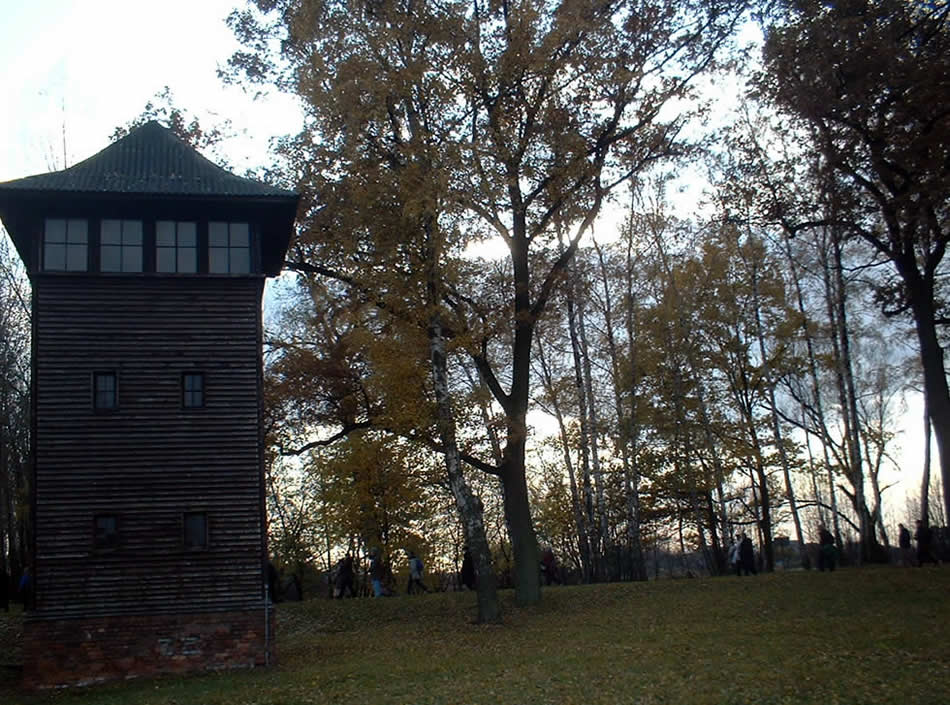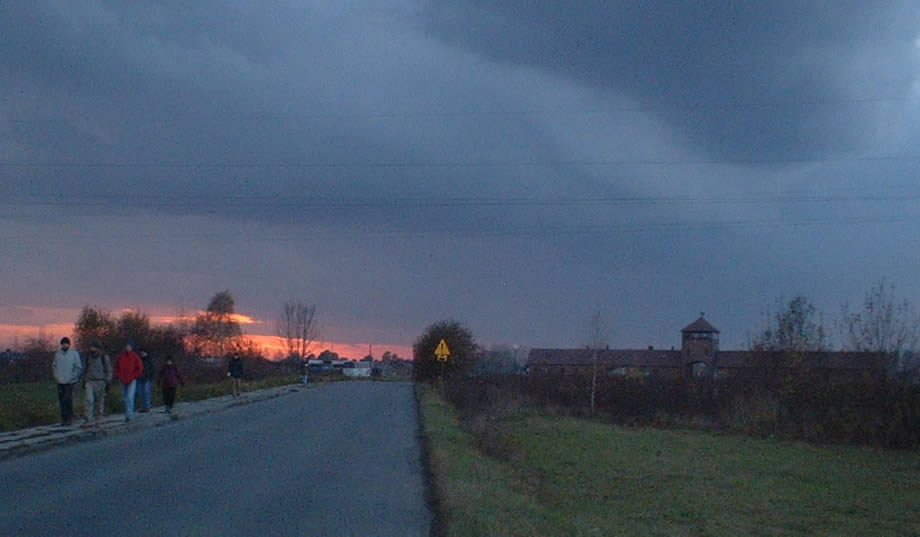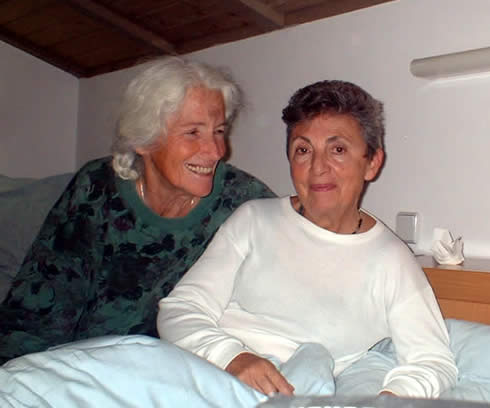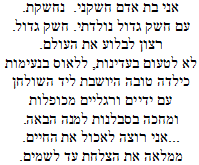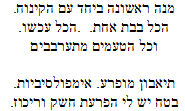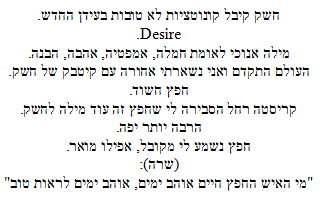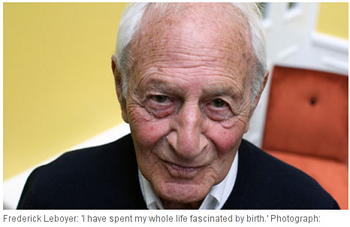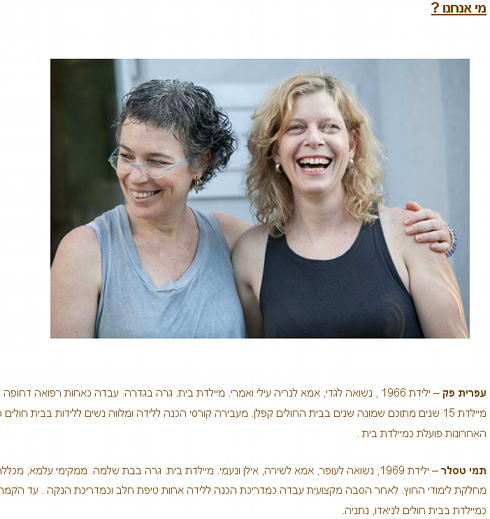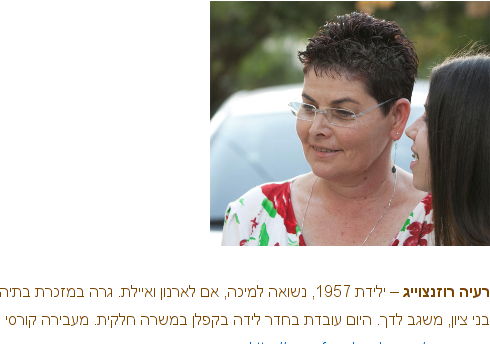|
|
|
2003_11_18 The concentration camp AU-schwitz served as an R&D lab for the
conduction of mass extermination. The birch was once my favorite tree, and I missed it in Israel.
The building amidst the beautiful "park"
is "the Sauna", a place of mass torture and the meadows beneath cover mass graves
|
2010
a significant communication took place in the new home
of Genine Gita-Zohara and Ronni Bar-El - at Rosh-Pina,
after - the evening before - we had "put to rest" my niece's family
in the Bar-Els' Bed&Breakfast castle at Safed,
See a story about me and Genine at "the Ashes' pond"!
The communication was about how to let go of "dispersion"
in order to fullfill her dream of writing, staging and acting,
and in order to let her husband fulfil their common dream
of making their castle into a "Way-Inn" for spiritual learning.
After Gita had brought me at 2:45 PM
to the bus-station ,
from where my travel to Arad would take almost 7 hours,
she had intended to go to her swimming pool,
yet ...........
Dearest Christa Rahel,
I so enjoyed our time together. Your visit inspired me to write.
After you left I sat for 3 hours and wrote the following:
(I never even got to swim!)
I asked her, if I could insert her poem, so as to give her yearning more
energy,
and this despite her projecting on me what she yearns for in herself,
thus making me "an angel" and even "a goddess".
I had just becried this attitude, which has caused me such suffering in
life,
and there I'm creating it again:
people projecting on me, instead of accepting me as their sounding-board.
See
the note at the end of "Day 38, Oct. 15, 2010 - of THE WAVE OF
WORLD GRATITUDE"
|
"Christa Gut" [my
family name was "Guth"]
An angel came to me today. I thanked her for coming to visit.
|
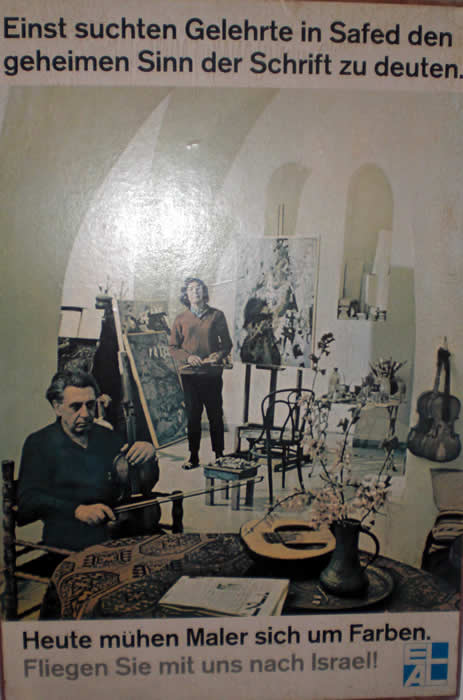 In the vaulted castle, where my guests would spend two nights, and were we closed our encounter by singing German canons, I discovered this German El-Al poster of the Sixties: "Once wise men at Safed searched for the secret meaning of the Bible, now painters endeavor to find colors. Fly with us to Israel!" |
|
You howled. Over and over. And today you share |
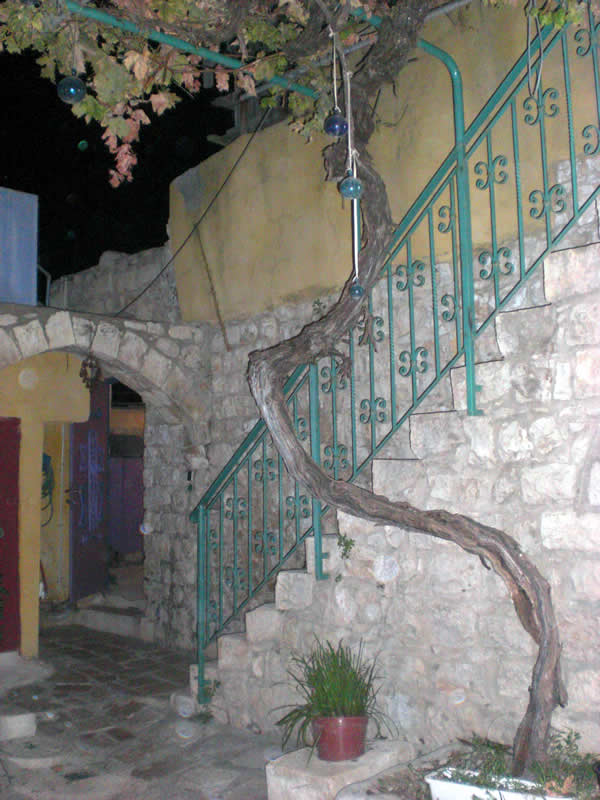 A vine in the court of the 'castle' at Safed, old, very old, but alive, and then - very similar - a rail made of olive wood - fresh but dead. |
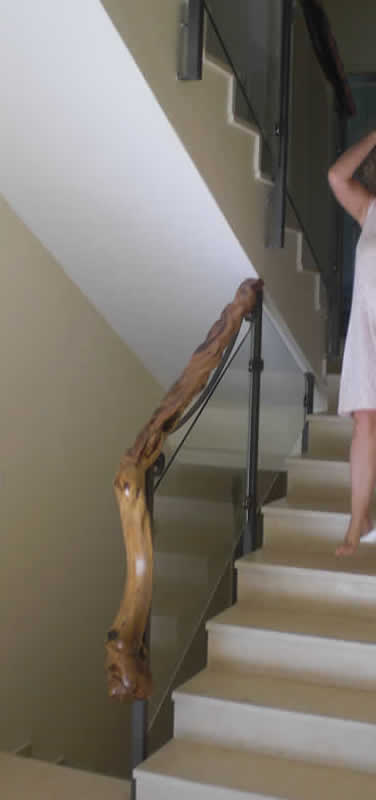 |
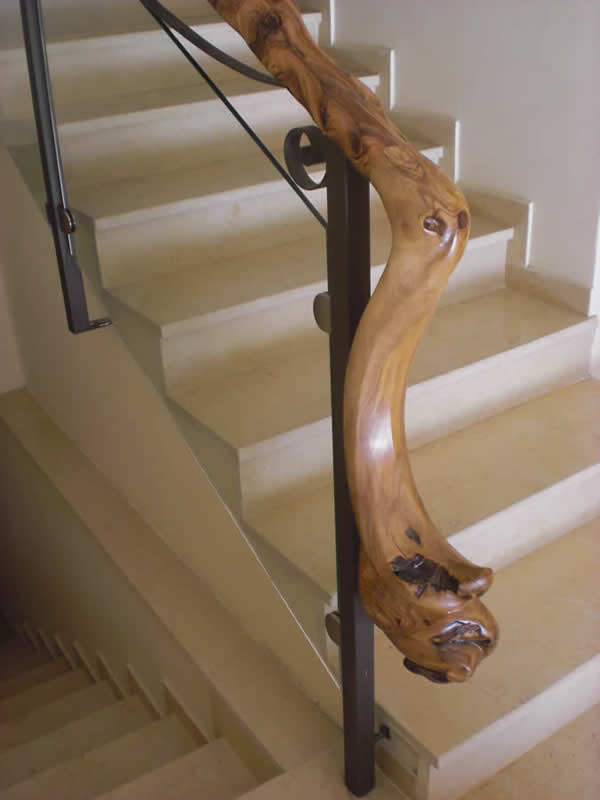 |
|
to return to her body, to reconnect. But instead of a soft fleshy nipple, a cold plastic bottle was inserted into my waiting wanting mouth. Playtex parted my tender lips, still wet with amniotic fluid while a nurse, her white uniform blindingly professional, glowed against the dim green hospital walls. |
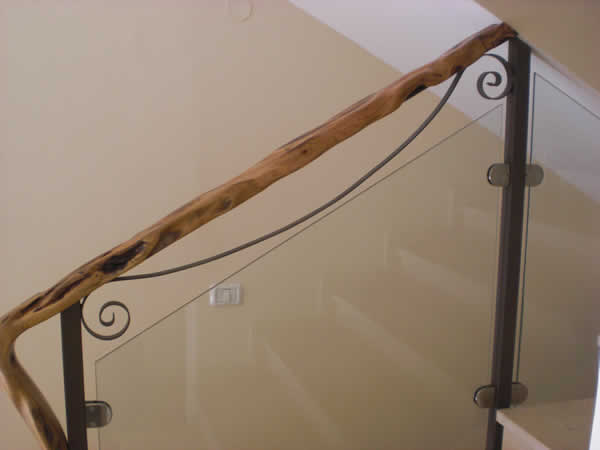 |
| All
I can make out in the blurry world of my newborn eyes |
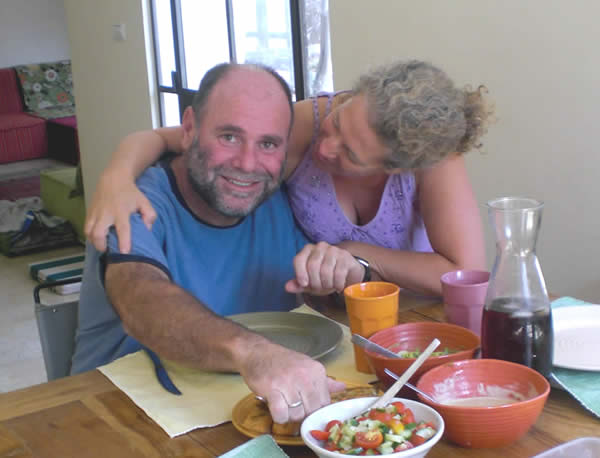 "Trust that they're making their lives work in the way that they're making their lives work. And just teach through the power of your example. " Abraham/Hicks 2002, e-mail quote 2010_10_26 |
BIRTHING
|
2010
|
2013-03-13 This column stayed empty - as if waiting for a complementing content - until I came -on 2013-03-13 -across this oh so relevant article about Frederick Leboyer "The Guardian", 2011-06-25 ----Hebrew translation in "Bet-Yoldot" 'Babies are overlooked in labour' In the 1970s this French obstetrician
enraged the medical profession by suggesting a baby had 'rights' during
labour. Despite initial resistance, his ideas for less medicalised
birth changed the face of the labour ward Almost 40 years ago, a French obstetrician had a revolutionary idea. Perhaps, he mused, those most closely involved in childbirth – obstetricians, midwives, even parents – were ignoring the person who mattered most of all. To make his point, he gave up being a hospital consultant and turned to writing instead. His seminal book followed soon afterwards: on one of its first few pages was a photograph showing a newborn, his mother, his father, and the doctor who had just attended his delivery. Everyone was smiling: but at the centre of the picture was a face that, far from being joyful, seemed contorted in pain and agony. "Everyone is radiant with happiness," the author explained. "Everyone except the child. The child? You hadn't even noticed the child, had you?" Thirty seven years on from the publication of Birth Without Violence, you might imagine that its author, Frederick Leboyer, who is now 93, had moved on to new concerns. Not a bit of it: his book is being republished this month and, like all true revolutionaries, age has not withered him. Especially not since he believes his creed is as relevant now as it ever was. .... "Birth is all about the child. Although everywhere you look, it seems to be about procedures and doctors and women." Leboyer hasn't much time for doctors and even less for procedures. While he has plenty of time for women and their role in childbirth, he does rather despair about them failing to "get" what he sees as the central point. "What you have to understand," he says, "is that birth is a challenge for a woman. To do her best for her baby, she has to face up to that challenge and not chicken out and have a caesarean instead." Does Leboyer really equate a caesarean section with "chickening out"? "Yes, I do, Having a caesarean is like reading a book and missing out a crucial chapter of the story – the most important chapter, in fact." Of course, he says, he is completely aware that caesareans sometimes save lives – for both babies and women (he nods vigorously when I tell him I had a section because of pre-eclampsia – yes, he says, that was a good reason). But women who choose to give birth surgically are, he thinks, much misguided... " Just as I cannot breathe for you or eat for you, or sleep for you, so I cannot give birth for you. Only you can give birth, for yourself." And how can women achieve that? "All pregnant women are frightened –... What a woman has to do is admit her fear, and look at what she is really afraid of. Only then can she begin to work through it and embrace the physical challenge of giving birth." ... He likens labour to a storm, through which a woman must sail her boat. "She has to remain the captain of her ship – it's that straightforward," ..."childbirth is a woman's secret garden ... it's the moment when a maiden dies and a mature woman is born". But his enduring contribution to childbirth, and the idea that ensured his place in 20th-century obstetric history, was his groundbreaking contention that a baby has "rights" at the delivery; that the baby, in a nutshell, has feelings and these feelings must be taken into account. Birth Without Violence told the story of birth from the baby's point of view – and in taking that perspective, Leboyer was able to raise powerful questions, for the first time, about how the delivery room would look and what it would feel like to the infant who emerged into it. The brightness of the lighting; the hubbub of the delivery room; the idea that the child was taken from the mother straight after birth – all this was put under scrutiny by Leboyer, for the first time in history. "Imagining birth as the baby experiences it was an entirely new way of looking at it," he says today. ........................... But others – especially midwives, and mothers – took heed, and things changed. It is thanks to Birth Without Violence that delivery rooms became quieter, calmer places with dimmed lighting and, sometimes, music playing quietly. Most importantly, perhaps, the baby was placed on its mother's belly as soon as it was born, and the medical establishment began to agree with Leboyer that – unless there were life-and-death medical reasons – the need to "bond" was more pressing than the immediate postnatal checks. Provided a baby was breathing, and its life wasn't in danger, what mattered most after birth was skin-to-skin contact – and gentleness. Leboyer also believed it was important to bathe a child as soon as possible after delivery. "Water, for a newborn, is a friend, For example, imagine that you go to Beijing. You don't know anyone and you don't speak Chinese. And then across a street you see someone you know, and that person's familiarity makes you feel safer. That is how water is to a baby: because he or she has been in the fluid of the womb, water is a known sensation. It's friendly. It calms." Because of Leboyer baths, as they became known, it is sometimes assumed that his ideas led to another obstetric innovation of the late 20th century, waterbirth. Not so, says the nonagenarian fiercely: in fact, paving the way for waterbirth was, he says, the very last thing he would have wanted. "Waterbirth is completely wrong, To give birth, you need to be on dry land." He confides that there is no love lost between him and the other leading French obstetrician of the 20th century, Michel Odent. Odent, says Leboyer, was originally his disciple, but "misunderstood" everything he was saying, and – as the chief architect of waterbirth – has taken things in entirely the wrong direction. Leboyer's decision to dedicate his life to childbirth came about, he believes, because of the circumstances of his own arrival, in Paris at the end of the first world war. "They used forceps to get me out, and four people held my mother down because there were no anaesthetics,It is because of that, the manner of my arrival, that I have spent my whole life fascinated by birth – because I always knew there was a better way." After quitting obstetric practice, he travelled widely in India – and what he saw and learned there influenced his ideas on birth hugely. He is an enthusiastic proponent of yoga, and puts his own remarkable health down to daily sessions of t'ai chi, which he learned from a master. What, though, of his other direct experiences of childbirth – has he, I ask, had children of his own? He looks at me with, for a moment, a twinkle in his 90-something eyes. "Not yet," he says, enjoying the wickedness of the idea that, even at his great age, progeny might be possible. But then he shakes his head slowly. "It's one of the greatest sadnesses of my life, really," he admits. "To have children is one of the greatest privileges that life holds." • A new edition of Birth Without Violence by Frederick Leboyer is published by Pinter and Martin,
2013-03-17
|
My question is:
Are women-in-labour encouraged to voice and scream their pain?
After I had birthed Micha, my third child, now Ra'ayah's husband,
I heard a midwife say to another, while pointing towards me:
"Today our job was easy, for since this woman kept quiet,
the other women did not dare to scream either."
And I, exhausted by an incredibly painful birthing process, felt proud!
YHWH , when giving birth, does no longer keep quiet , but screams:

Put into tune by me on January 20, 2011
Be Sounding! -Be Sound - not silent!


